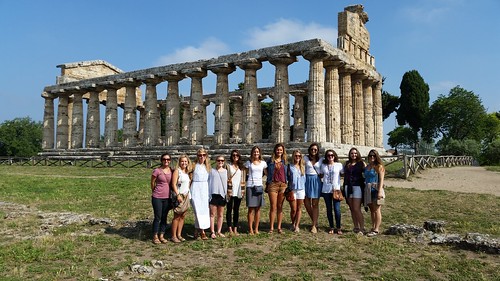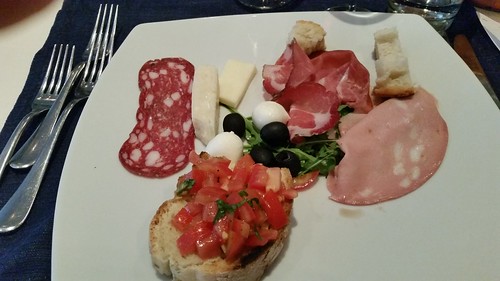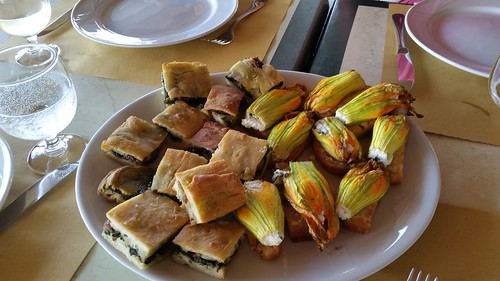New study tour option lets students experience Mediterranean Diet in Southern Italy
Article body
This summer marked the first time Auburn University students studying nutrition or food science had the opportunity to learn about the Mediterranean Diet in the Mediterranean.
Assistant Professor Michael Greene and Associate Professor Patty Marincic, nutrition faculty in the Department of Nutrition, Dietetics and Hospitality Management in the College of Human Sciences, developed the new three-week study abroad program for nutrition and food science majors as a way of introducing them "to a dietary approach that is not just in the classroom."
"I wanted them to experience it. Food is a big part of the culture and going over there was a big part of the experience," explained Greene.
The Mediterranean Diet is inspired by the dietary patterns of countries bordering the Mediterranean Sea and focuses on the consumption of fish, olive oil, peas and beans, fruits, vegetables, cheese, yogurt and even wine. To experience this practice firsthand, students went to Rome and Cilento in Southern Italy.
A partnership with the Gustolab International Institute for Food Studies in Rome provided students with cooking classes, wine tastings, cheese making and olive oil tastings. In one cooking class, students learned how to make mayonnaise and salad dressing from Chef Cristina Bowerman, a native of Southern Italy.
"It was cool to learn basic things that you use in other dishes," said nutrition/dietetics senior Katie Nahay. "It's essential to learn the basics. People aren't willing to give up the big things, but as dieticians, if we can get them to give up something small that's where we can make it work."
Emily Unwin, a junior in nutrition/dietetics, said she felt like all the ideas she had learned in class finally came to life on the trip.
"Going in, my personal nutrition philosophy has been whole foods and eating local, but I had never really seen it in action. I never really did it for myself," she said. "Going over there and seeing it, seeing how it happened made me come back and seek out local food and farmer's markets. This trip made me more conscious of my own food choices."
A memorable stop was at Tenuta Vannulo, a privately owned farm and buffalo mozzarella producer. Water buffalo roamed the pasture, would walk in to be milked whenever they wanted and were even treated to an automatic back massage at their convenience. The owners believe a happy buffalo produces better milk, and, according to Greene, the end product seemed to uphold that belief.
Another excursion was to the white fig of Cilento producer, Santomiele.
"We were told we were going to a fig farm," said Unwin, "so you think farm, countryside. We show up and it's in the middle of a downtown area, down a side street and then we were in the middle of this beautiful office space/chic apartment. It was so unexpected in the best way possible."
Nahay, who said she was impressed with the simplicity of the Mediterranean Diet, referenced a visit to Cooperativa Nuovo Cilento, an agricultural cooperative and Italy's largest producer of organic olive oil, where they were served a simple white potato with salt and olive oil.
"It was one of the best things," she said. "We use so many spices and cover everything up. In Italy, they let the food speak for itself."
Unwin said she noticed a sharp contrast in food production styles between the U.S. and Italy.
"Their farms were not monoculture," she said. "There were pigs, donkeys, horses and acres of different vegetables. It was diversified, not just a field of corn and a field of livestock."
The trip may have focused on food, but Greene said students learned so much more.
"If you are going into a profession that is associated with food, you should understand where it comes from and how the people are connected to it," he said. "Understanding healthy food and its connection to people is even more important. The Mediterranean Diet study tour is just one way to do that in a beautiful, fun, historic way."
Related Media
Media interested in this story can contact Communications Director Preston Sparks at (334) 844-9999 or preston.sparks@auburn.edu.
Auburn University is a nationally ranked land grant institution recognized for its commitment to world-class scholarship, interdisciplinary research with an elite, top-tier Carnegie R1 classification, life-changing outreach with Carnegie’s Community Engagement designation and an undergraduate education experience second to none. Auburn is home to more than 30,000 students, and its faculty and research partners collaborate to develop and deliver meaningful scholarship, science and technology-based advancements that meet pressing regional, national and global needs. Auburn’s commitment to active student engagement, professional success and public/private partnership drives a growing reputation for outreach and extension that delivers broad economic, health and societal impact.








